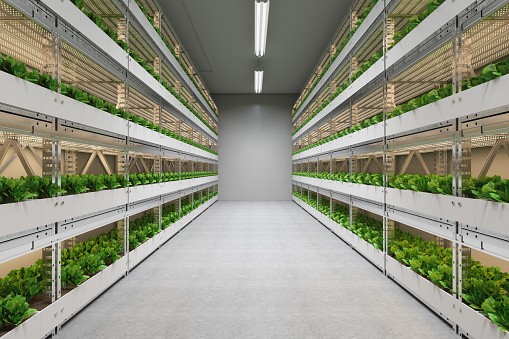The Future of Vertical Farming in UAE

Agriculture played a major role in the birth of every civilization that is known to us. Increasing farming operations and technological capabilities to meet rising demand and consumption was essential for food sustainability then, as it is now. Countries like the UAE are increasingly investing in advanced methods of agriculture like vertical farming to reduce their reliance on global supply chains and improve food security.
Vertical farming is an energy-intensive production method that uses artificial lighting indoors, resulting in high environmental impacts in our current fossil-fuel-based economy. However, it employs soilless methods such as hydroponics, aquaponics, and aeroponics, which produce little waste. Why is vertical farming in the UAE important? Because the UAE suffers greatly from water scarcity, vertical farming in the UAE has proven to be a blessing in disguise. This process has no seasons and can be done all year. Instead of soil, plants here feed on a nutrient solution. Temperature and humidity are controlled in a container.
Vertical farming is also helpful in meeting consumers' changing tastes and expectations. Let's check out what is the future potential of vertical farming in the coming years,
- Increased Production of Organic Crops: As crops are produced in a well-controlled indoor environment without chemical pesticides, vertical farming allows us to grow pesticide-free and organic crops. Farmers can increase productivity in smaller spaces by stacking layers vertically and integrating them into environments that aren't conducive to traditional farming, such as tall buildings, warehouses, shipping containers, greenhouses, and more.

- Water and soil management: Over 2 billion people live in countries with severe water scarcity. According to the UN, this number is expected to rise as climate change worsens and populations grow. Agriculture consumes 69% of the world's water, and vertical farming consumes 95% less than traditional methods. Vertical farming's small footprint also alleviates pressure on the planet's arable land by reducing water runoff and allowing topsoil to replenish.
- Sustainable farming: Vertical farming in a closed environment can solve some of the problems associated with industrial agricultural practices by stacking crops, recycling nutrients, and controlling pests without the use of harmful chemicals. As a result, it will not cause the problems associated with monocultures, nitrogen and phosphorus runoff, or pesticide use.
- Supply chain management: Vertical farming has the potential to significantly reduce fuel-intensive long-distance trucking and food waste by supplying local and perishable specialty crops to urban areas. They can also protect these population centers from supply chain disruptions like the ones we're currently experiencing.
- Food security: With the world's population expected to exceed 9 billion by 2050, nations must increase food production by 70%. Vertical farms' modular design allows operators to adapt to changing growing conditions while producing 75 times more food per square foot than traditional farms.
- Carbon footprint: Two out of three people will be living in urban areas by 2050. Vertical farms can produce fresh vegetables close to these populations to meet food demands more sustainably by shortening distribution chains and lowering emissions in the process.

-
Predictable yield: Climate change and high temperatures reduce crop yields while encouraging the spread of weeds and pests. Extreme weather, changing climate patterns, and pests are not affecting the crops in vertical farms. Crops can grow in a wider range of latitudes and produce more predictable results. We desperately need new ways to grow our food. As the global middle class burgeons, the world must produce 70% more calories and at least 100% more total agricultural crops by 2050.
-
Healthier produce: Vertical farming is safer and healthier for farmers, the environment, and consumers because it eliminates the need for pesticides and fungicides. Vertical farming prevents soil erosion and nutrient loss as well. It is capable of producing nutrient-dense crops without the use of costly fertilizers.
Without the development of alternative agricultural techniques, such as vertical farms, the increased production that will undoubtedly be needed to support a population that is always rising will just exacerbate the current concerns and probably lead to new ones.
Operating indoor vertical farms allows for the relocation of carefully controlled indoor climates to almost any location on the planet. Vertical farming makes the best use of natural resources to maximize crop production, quality, and availability.
It's also evident that Vertical farming is safer and healthier for farmers, the environment, and consumers since pesticides and fungicides can no longer be used. Furthermore, it can produce nutrient-dense crops without using fertilizers.
At Unsfarms, we strive to provide our customers with healthy, high-quality leafy greens. Using optimal resources, we aim to create natural, healthy, safe foods with 90% less water, 1/4 less land, and zero chemicals.

